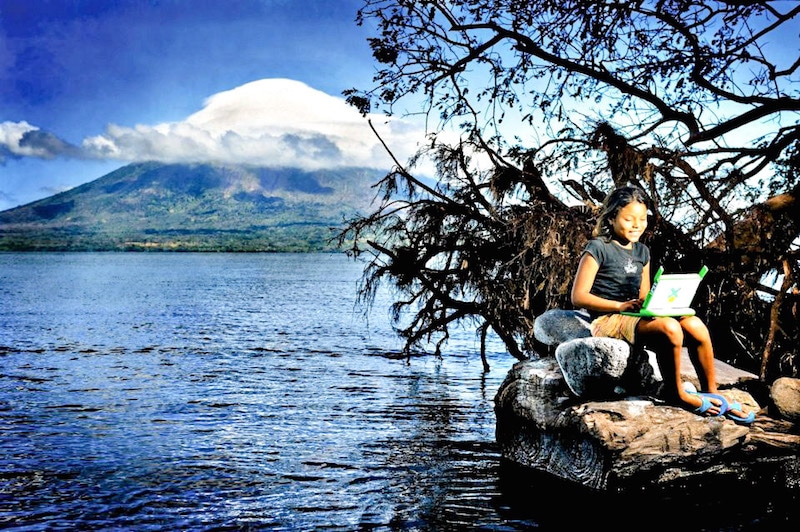Guest post by Richard Caraballo from the Kamba Dyami Project in Angola
Paul wasn’t a typical child from Angola. He was quiet as well as shy, but he was always laughing. He had green eyes and black hair. He was very tall for his age.  He was living in a poor neighborhood called Lixeira (Portuguese for “dustbinâ€).
 It was a normal day when Paul arrived at school. Deep in his heart, he felt that something was about to happen, but he didn’t know what. When he enteredhis classroom, he saw that his peers were excited about something. So he asked his teacher: “Why is everyone so excited?†The teacher answered: “We have a new friend named Kamba Dyami and it is a computer.†Paul asked: “Kamba Dyami?†“Which means MY FRIEND in one of the African languages used in Angola. The language is called Kinbunduâ€,said the teacher. Paul sat in his place a little bit confused, though he liked the idea of having this new friend as he’d never had a computer in his hands before.
It was a normal day when Paul arrived at school. Deep in his heart, he felt that something was about to happen, but he didn’t know what. When he enteredhis classroom, he saw that his peers were excited about something. So he asked his teacher: “Why is everyone so excited?†The teacher answered: “We have a new friend named Kamba Dyami and it is a computer.†Paul asked: “Kamba Dyami?†“Which means MY FRIEND in one of the African languages used in Angola. The language is called Kinbunduâ€,said the teacher. Paul sat in his place a little bit confused, though he liked the idea of having this new friend as he’d never had a computer in his hands before.
After ten minutes, the teacher entered with the “new friend†and gave one to each student. The teacher also got a new friend, but he didn’t know how it worked either.
Two of Paul´s friends, who were living near his house, asked him about this computer, but Paul couldn´t explain what it was because it was the first time he held one.
The class was very noisy when a stranger entered. At the moment when he entered everyone made silence. This strange man came to explain all about Kamba Dyami. Also, he came with a challenge for the class. Everyone had to make a video about their neighborhood using this new technology. After one week, he was to choose one to receive a prize.
The strange man gave them a few instructions. They had to interview a number of neighbors about garbage. “What do you think about trash in our neighborhood? Why do we have so much waste here? What do you propose we do to eliminate litter at Lixeira?”
 Paul, who was born in Lixeira, had never asked himself these questions. On the other hand, he thought this was a real challenge. He was concerned thinking that he wouldn’t be able to complete the project because of the problems he had with his parents and siblings. They didn´t pay attention to him because they thought work was more important than studying. However, it was now mandatory for children to attend school in the country. When Paul´s parents and siblings were children, studying wasn´t obligatory.
Paul, who was born in Lixeira, had never asked himself these questions. On the other hand, he thought this was a real challenge. He was concerned thinking that he wouldn’t be able to complete the project because of the problems he had with his parents and siblings. They didn´t pay attention to him because they thought work was more important than studying. However, it was now mandatory for children to attend school in the country. When Paul´s parents and siblings were children, studying wasn´t obligatory.
The stranger in Paul’s classroom was a big, serious and strict man. He started to look around to pick a student to do the project. Paul hid behind his fellow students because he didn’t want to be chosen as he was nervous. The stranger was looking for an interesting student; he looked at Paul and chose him. Paul thought: “Oh no, what I am going to do? This job is impossible for me and I have only one week to complete it.â€
But Paul learned to use Kamba Dyami faster than he thought. During the first and the second day, he wasn’t able to do any interviews because he had to work with his family. On the third day, his brothers took the computer and they didn’t want to give it back to him. Paul already knew a lot about the Kamba Dyami laptop because he had already explored all the activities it had. However, he wasn’t able to do any interviews until the fourth day.
The neighbors saw him walking around the neighborhood with the computer. They asked his parents what was going on, but Paul’s parents answered that what he was doing really didn´t matter. On the other hand, people saw Paul’s computer ability and they encouraged him to become a master of this technology and told him that nobody in the neighborhood could use a computer as well as him.
On the last day, he was able to complete many interviews around the neighborhood and accomplished his task. This was a big challenge for Paul.
Through this activity, Paul not only learned to use the computer, he also learned a lot about life. He learned about the people who were living in his neighborhood. He acquired new skills and learned that he can change his own future through education.










